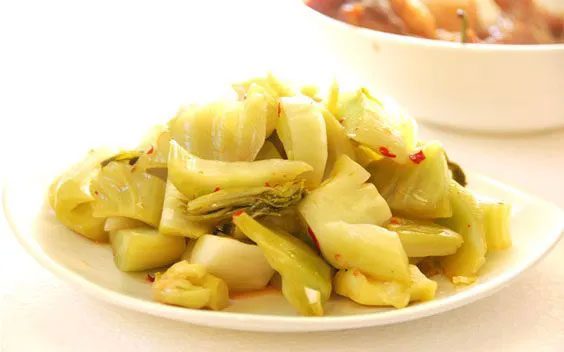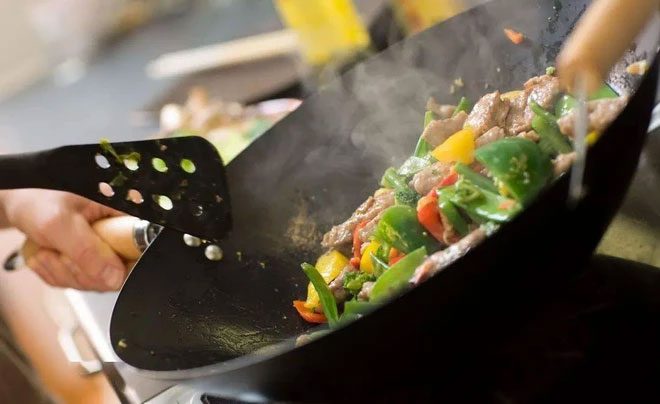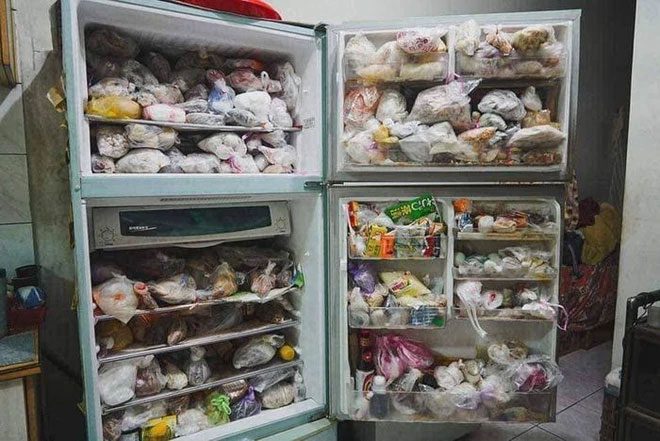Many people believe that eating out is not good for health. However, certain cooking mistakes can pose serious risks to the family, potentially even increasing cancer risk.
1. Improper Food Combinations
Incorrect combinations of foods on the dining table can increase the risk of cancer:
Stir-fried or fried potatoes… are high in carbohydrates, especially after frying. Eating them with white rice can lead to excessive carbohydrate intake. When carbohydrates are not converted into energy, they accumulate as excess fat in the body, increasing the risk of obesity.
Research shows that obesity is closely linked to the development of 13 different types of cancer, including breast cancer, esophageal cancer, and liver cancer.
Porridge and pickled vegetables: Although this is a convenient and tasty breakfast option for many, consuming too much can lead to nutritional deficiencies. Additionally, excessive intake of pickled vegetables can result in an overconsumption of salt, increasing the risk of esophageal and stomach cancer.

Porridge and pickled vegetables are convenient breakfast options, but excessive consumption can lead to nutritional deficiencies.
A meal high in meat, fried foods, and oils with insufficient vegetables can lead to a lack of essential fiber, increasing the risk of colorectal cancer.
Therefore, proper and balanced food combinations are essential during cooking. Meals should be diverse; ideally, one should consume more than 12 different types of food each day and more than 25 different foods each week.
2. Using a Damaged Rice Cooker Inner Pot
The inner pot of a rice cooker is typically coated with a layer of Teflon. Over time, this coating can become scratched or peel off. If ingested, these particles can negatively impact health. Cooked rice can contain carcinogenic substances like acrylamide.
Thus, it’s important to carefully maintain the inner pot of the rice cooker and avoid using hard, abrasive cleaning tools. When the inner coating begins to peel, it’s best to replace it promptly.
Additionally, wooden kitchen items like cutting boards and chopsticks can develop small scratches over time, which can become breeding grounds for bacteria after frequent exposure to water. If mold appears on these items, it signifies that mold is developing inside. Aflatoxin found in mold can cause liver cancer.
Therefore, clean wooden kitchen items immediately after use and store them in a dry, cool place. Also, replace them if any signs of mold appear.
3. Adding Food to Oil Only When It’s Smoking
Many people wait until the oil is smoking on the stove before adding food to fry or sauté, thinking it will taste better. However, the vegetable oils we use today are refined and can reach high temperatures before smoking, often exceeding 200 degrees Celsius.
This not only destroys vitamins, proteins, and other nutrients in the cooking oil but also produces numerous carcinogens such as acrylamide, heterocyclic amines, and benzopyrene. Therefore, oil should only be used when heated to 50-60%. The best way to check is to insert a chopstick into the oil; when small bubbles appear around it, the oil is ready for use.

Food residue when reheated can ignite, promoting cancer development.
4. Using One Pot for Multiple Dishes in a Row
Many people, to save time and effort, tend to use one pot to cook multiple dishes consecutively. While this may seem harmless, residues like grease and food particles can pose health risks. Reheating oil at high temperatures can produce carcinogens. Food residue can ignite, contributing to cancer development.
Additionally, many people reuse oil that has already been fried in multiple dishes. However, after frying food at high temperatures, the oil generates carcinogens such as heterocyclic amines and benzopyrene. Reusing this oil in cooking can significantly increase the levels of these harmful substances.
5. Poorly Ventilated Kitchen
Many families have cramped kitchens without windows, exhaust fans, or even have the habit of closing windows while cooking. This can inadvertently endanger the health of the entire family. Natural combustion can produce a large amount of carbon dioxide; if the kitchen is not well-ventilated, the concentration of this gas will rise significantly.
When a person inhales a large amount of carbon dioxide, it can activate the sympathetic nervous system, increasing blood pressure and heart rate. It can also increase peripheral vascular resistance, which will significantly affect blood pressure. This can lead to further complications for those already experiencing high blood pressure, high cholesterol, or high blood sugar levels.
6. Overstuffed Refrigerator

An overstuffed refrigerator prevents air circulation.
Fresh vegetables, leftover food, drinks… often leave many refrigerators packed to capacity. However, if the refrigerator is too full, it prevents air circulation, raises temperatures, promotes the growth and reproduction of bacteria, and speeds up food spoilage.
Therefore, a refrigerator should be filled to a maximum of 70% to ensure proper air circulation. Regular cleaning of the refrigerator is also essential.


















































